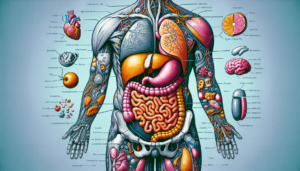Living with hsv-2 can be challenging, but suppressive therapy offers hope and relief. This article explores the effectiveness of suppressive therapy in managing hsv-2 outbreaks. From reducing the frequency of outbreaks to minimizing the risk of transmission, suppressive therapy has proven to be a valuable option for those affected by hsv-2. Discover the benefits, considerations, and possible side effects of suppressive therapy as you navigate your journey towards a better quality of life.


What is HSV-2?
HSV-2, or herpes simplex virus type 2, is a sexually transmitted infection that primarily affects the genital area. It is a common and highly contagious virus that can cause recurring outbreaks of sores or blisters. HSV-2 is spread through sexual contact with an infected partner, and it can also be transmitted from a pregnant woman to her baby during childbirth.
Transmission of HSV-2
HSV-2 is mainly transmitted through sexual contact, including vaginal, anal, and oral sex. The virus can be present in the genital area, even if there are no visible sores or symptoms. It can also be transmitted through close personal contact, such as kissing or sharing sex toys. It is important to note that even if you do not have any symptoms, you can still pass the virus to your partner.
Risk Factors for HSV-2 Infection
Certain factors can increase the risk of acquiring HSV-2 infection. These include having multiple sexual partners, engaging in unprotected sex, having a compromised immune system, and having a history of other sexually transmitted infections. Additionally, individuals who engage in sexual activity at a younger age have a higher risk of acquiring HSV-2.
Symptoms of HSV-2 Infection
Symptoms of HSV-2 infection can vary from person to person. Some individuals may experience severe outbreaks with painful blisters or ulcers, while others may have mild or no symptoms at all. Common symptoms include genital sores, itching, tingling, burning sensation, and flu-like symptoms such as fever and body aches. It is important to remember that symptoms may come and go, and some individuals may only have one outbreak in their lifetime.
Suppressive Therapy for HSV-2
Suppressive therapy for HSV-2 involves taking antiviral medications on a daily basis to reduce the frequency and severity of outbreaks. This approach aims to keep the virus in a dormant state and decrease viral shedding, which can help reduce the risk of transmission to sexual partners.
Definition of Suppressive Therapy
Suppressive therapy, also known as daily suppressive therapy or continuous suppressive therapy, involves taking antiviral medications every day for an extended period of time. The goal of suppressive therapy is to minimize the frequency and duration of HSV-2 outbreaks, as well as to reduce the risk of transmitting the virus to others.
Goals of Suppressive Therapy
The main goal of suppressive therapy for HSV-2 is to improve the quality of life for individuals with the infection. By reducing the frequency and severity of outbreaks, suppressive therapy can help alleviate pain, discomfort, and emotional distress associated with HSV-2. Additionally, it aims to reduce the risk of transmission to sexual partners and decrease the overall burden of the virus on individuals’ lives.
Effectiveness of Suppressive Therapy
Suppressive therapy has been shown to be highly effective in managing HSV-2 infection. Studies have demonstrated that individuals taking daily antiviral medications experience a significant reduction in the frequency of outbreaks. Some research suggests that suppressive therapy can reduce the risk of transmission by up to 50%. However, it is important to note that while suppressive therapy can reduce the risk, it does not completely eliminate it.


Antiviral Medications for Suppressive Therapy
Several antiviral medications are commonly used for suppressive therapy of HSV-2. These medications work by inhibiting the replication of the virus, thereby reducing the severity and duration of outbreaks. They can also help prevent the virus from shedding, which lowers the risk of transmission.
Types of Antiviral Medications
The two main types of antiviral medications used in suppressive therapy for HSV-2 are:
Acyclovir: Acyclovir is an older medication that has been widely used for the treatment of herpes infections. It is available in oral, topical, and intravenous forms.
Valacyclovir: Valacyclovir is a prodrug of acyclovir, meaning that it is converted into acyclovir in the body. It has a higher bioavailability and requires less frequent dosing compared to acyclovir.
Commonly Used Antiviral Medications
Acyclovir, valacyclovir, and famciclovir are three of the most commonly used antiviral medications for suppressive therapy of HSV-2. These medications are generally well-tolerated and have been proven effective in reducing the frequency and severity of outbreaks.
Dosage and Administration of Antiviral Medications
The dosage and administration of antiviral medications for suppressive therapy may vary depending on the specific medication prescribed and individual factors. It is important to follow the healthcare provider’s instructions and take the medications as directed. Typically, antiviral medications are taken orally and can be prescribed for daily use or intermittent use during periods of increased risk or outbreaks.
Benefits of Suppressive Therapy
Suppressive therapy for HSV-2 offers several benefits to individuals with the infection. These include:
Reduced Frequency and Severity of Outbreaks
Suppressive therapy can significantly reduce the frequency of outbreaks, with some individuals experiencing no outbreaks at all. The severity and duration of outbreaks are also typically reduced, resulting in less pain and discomfort.
Decreased Risk of Transmission
By taking antiviral medications daily, the risk of transmitting HSV-2 to sexual partners can be significantly reduced. While the risk is not eliminated completely, suppressive therapy can provide a level of protection and peace of mind.
Improvement in Quality of Life
Suppressive therapy can greatly improve the quality of life for individuals with HSV-2. With fewer outbreaks and reduced symptoms, individuals can lead more normal lives without the constant worry and discomfort associated with the infection.
Considerations Before Starting Suppressive Therapy
Before starting suppressive therapy for HSV-2, there are several important considerations that individuals should discuss with their healthcare provider. These include:
Medical Evaluation
It is important to undergo a thorough medical evaluation to ensure that suppressive therapy is appropriate and safe for you. Your healthcare provider will consider your medical history, any underlying health conditions, and potential drug interactions before prescribing antiviral medications.
Potential Side Effects
While antiviral medications for suppressive therapy are generally well-tolerated, they can cause side effects in some individuals. These can include headaches, nausea, dizziness, and fatigue. It is important to discuss potential side effects with your healthcare provider.
Cost and Availability
Antiviral medications can vary in cost and availability. It is important to consider your insurance coverage, out-of-pocket expenses, and the availability of the prescribed medication in your area. Your healthcare provider may be able to provide guidance on accessing these medications.
Effectiveness of Suppressive Therapy in Special Populations
Suppressive therapy is also effective in special populations, including pregnant women, patients with HIV infection, and individuals who are immunocompromised.
Suppressive Therapy in Pregnant Women
Suppressive therapy is recommended for pregnant women with HSV-2 to reduce the risk of transmitting the infection to their baby during childbirth. It is important for pregnant women to discuss suppressive therapy with their healthcare provider and follow their recommendations.
Suppressive Therapy in Patients with HIV Infection
Suppressive therapy is also beneficial for individuals with HIV infection who have HSV-2. It can help decrease HIV viral load and reduce the risk of HIV transmission. Individuals with HIV should work closely with their healthcare provider to manage both infections effectively.
Suppressive Therapy in Immunocompromised Individuals
Suppressive therapy is generally safe and effective for individuals who are immunocompromised, such as those with organ transplants or on immunosuppressive medications. However, it is crucial for these individuals to consult with their healthcare provider to ensure the appropriate management of their condition.
Long-term Use of Suppressive Therapy
Suppressive therapy can be used for an extended period of time, and in many cases, long-term use may be recommended.
Safety of Long-term Use
Antiviral medications used for suppressive therapy are generally safe for long-term use. They have been extensively studied and have a well-established safety profile. However, individuals should continue to be monitored by their healthcare provider to ensure any potential side effects are addressed.
Monitoring and Evaluation
Regular monitoring and evaluation are important when using suppressive therapy on a long-term basis. This includes regular check-ups with a healthcare provider, evaluation of viral load and outbreak frequency, and assessment of any potential complications.
Discontinuation of Suppressive Therapy
The decision to discontinue suppressive therapy should be made in consultation with a healthcare provider. It is important to carefully weigh the risks and benefits, as well as consider individual factors such as outbreak frequency, transmission risk, and overall health status.

Alternative Approaches to Managing HSV-2
While suppressive therapy is a common and effective approach to managing HSV-2, there are alternative approaches that individuals may consider.
Episodic Therapy
Episodic therapy involves taking antiviral medication at the onset of symptoms or outbreaks to reduce their duration and severity. This approach may be suitable for individuals who have infrequent outbreaks or prefer a more on-demand treatment option.
Natural Remedies and Lifestyle Changes
Some individuals may explore natural remedies and lifestyle changes to manage HSV-2 symptoms and outbreaks. These can include stress reduction techniques, maintaining a healthy lifestyle, and using topical treatments such as aloe vera or lemon balm. However, it is important to note that there is limited scientific evidence supporting the effectiveness of these approaches.
Experimental Treatments
There are ongoing research efforts to develop new treatments for HSV-2, including experimental antiviral drugs and vaccines. These treatments are still in the development and testing stages and are not yet widely available. Individuals interested in participating in clinical trials for experimental treatments should consult with their healthcare provider.
Supportive Measures for HSV-2
In addition to medical treatments, several supportive measures can help individuals manage HSV-2.
Advocacy and Education
Advocacy groups and educational resources can provide valuable information and support for individuals with HSV-2. These organizations work to raise awareness, reduce stigma, and provide resources for managing the infection.
Counseling and Emotional Support
Living with HSV-2 can have emotional and psychological impacts. Counseling and emotional support can be beneficial for individuals dealing with the social and emotional aspects of the infection. Support groups, therapy, and online forums can provide a sense of community and a safe space to share experiences.
Prevention Strategies
Prevention strategies, such as practicing safe sex, using condoms, and disclosing your HSV-2 status to sexual partners, can help reduce the risk of transmission. Regular communication with sexual partners and open discussions about sexual health are crucial in preventing the spread of HSV-2.
Future Directions in HSV-2 Treatment
Research efforts continue to advance the understanding and treatment of HSV-2. Several future directions show promise in managing and preventing the infection.
Vaccine Development
The development of a safe and effective vaccine for HSV-2 is a major goal in reducing transmission and managing the infection. Several vaccine candidates are currently being studied in clinical trials, and early results have shown promise in preventing or reducing the severity of HSV-2 outbreaks.
Novel Antiviral Drugs
Ongoing research aims to develop new antiviral drugs that target different aspects of the HSV-2 replication cycle. These novel drugs may offer improved effectiveness, reduced side effects, and alternative treatment options for individuals with HSV-2.
Combination Therapy
Combining different antiviral drugs or treatment modalities may offer enhanced effectiveness for managing HSV-2. Combination therapy aims to target the virus from multiple angles and reduce the risk of antiviral resistance.
In conclusion, suppressive therapy for HSV-2 plays a critical role in managing and reducing the impact of this common sexually transmitted infection. By taking antiviral medications daily, individuals can experience fewer outbreaks, decreased severity of symptoms, and a decreased risk of transmission. Long-term use of suppressive therapy is generally safe and can greatly improve the quality of life for individuals with HSV-2. It is important to discuss suppressive therapy with a healthcare provider, consider potential side effects and costs, and explore alternative approaches to managing the infection. Ongoing research and development in HSV-2 treatment offer hope for improved therapies, including the development of a vaccine and novel antiviral drugs.




